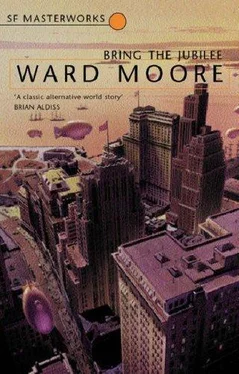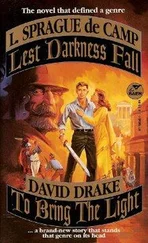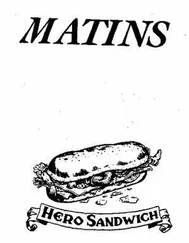When one did, the jolting, jouncing, and shaking inevitably broke or disconnected one of the delicate parts in its complex mechanism. Then the only recourse—apart from telegraphing back to the city if the traveler broke down near an instrument—was the closest blacksmith. Smiths rarely knew much of the principles of the minibiles, but with the broken part before them they could fabricate a passable duplicate and, unless the machine had suffered severe damage, put it back in place. It was customary for such a craftsman to compensate himself for the time taken away from horseshoeing or spring-fitting—or just absently chewing on an oat straw—by demanding exorbitant remuneration, amounting to perhaps twenty-five or thirty cents an hour, thus avenging his rural poverty and self-sufficiency upon the effete wealth and helplessness of the urban excursionist.
Such a golden opportunity befell my father, as I said, during the fall of 1933, when I was twelve. The driver had made his way to the smithy, leaving the owner of the minibile marooned and fuming in the enclosed passenger seat. A hasty visit convinced Father, who could repair a clock or broken rake with equal dexterity, that his only course was to bring the machine to the forge where he could heat and straighten a part not easy to disassemble. (The driver, the owner, and Father all repeated the name of the part often enough, but so inept have I been with “practical” things all my life that I couldn't recall it ten minutes, much less thirty years later.)
“Hodge, run and get the mare and ride over to Jones's. Don't try to saddle her—go bareback. Ask Mr. Jones to kindly lend me his team.”
“I'll give the boy a quarter dollar for himself if he's back with the team in twenty minutes,” added the owner of the minibile, sticking his head out of the window.
I won't say I was off like the wind, for my life's work has given me a distaste for exaggeration or hyperbole, but I moved faster than I ever had before. A quarter, a whole shining silver quarter, a day's full wage for the boy who could find odd jobs, half the day's pay of a grown man who wasn't indented or worked extra hours—all for myself, to spend as I wished!
I ran all the way back to the barn, led Bessie out by her halter, and jumped on her broad back, my enthralling daydream growing and deepening each moment. With my quarter safely got I could perhaps persuade my father to take me along on his next trip to Poughkeepsie; in the shops there I could find some yards of figured cotton for Mother, or a box of cigars to which Father was partial but rarely bought for himself, or an unimagined something for Mary McCutcheon, some three years older than I, with whom it had so recently become disturbing as well as imperative to wrestle, in secret of course so as not to show oneself unmanly in sporting with a weak girl instead of another boy.
It never even occurred to me, as it would have to most, to invest in an eighth of a lottery ticket. Not only were my parents sternly against this popular gamble, but I myself felt a strangely puritanical aversion to meddling with my fortune.
Or I could take the entire quarter into Newman's Book and Clock Store. Here I could not afford one of the latest English or Confederate books—even the novels I disdained cost fifty cents in their original and thirty in the pirated United States' edition—but what treasures there were in the twelve-and-a-half-cent reprints and the dime classics!
With Bessie's legs moving steadily beneath me I pored over in my imagination Mr. Newman's entire stock, which I knew by heart from examinations lulled by the steady ticking of his other, and no doubt more salable, merchandise. My quarter would buy two reprints, but I would read them in as many evenings and be no better off than before until their memory faded and I could read them again. Better to invest in paperback adventure stories giving sharp, breathless pictures of life in the West or rekindling the glories of the war. True, they were written almost entirely by Confederate authors, and I was, perhaps thanks to Granpa Hodgins and my mother, a devout partisan of the lost cause of Sheridan and Sherman and Thomas. But patriotism couldn't steel me against the excitement of the Confederate paperbacks; literature simply ignored the boundary stretching to the Pacific.
I had finally determined to invest all my twenty-five cents, not in five paperbound volumes but in ten of the same in secondhand or shopworn condition, when I suddenly realized that I had been riding Bessie for some considerable time. I looked around, rather dazed by the abrupt translation from the dark and slightly musty interior of Newman's store to the bright countryside, to find with dismay that Bessie hadn't taken me to the Jones farm after all but on some private tour of her own in the opposite direction.
I'm afraid this little anecdote is pointless—it was momentarily pointed enough for me that evening, for in addition to the loss of the promised quarter I received a thorough whacking with a willow switch from my mother after my father had, as usual, dolefully refused his parental duty— except perhaps that it shows how in pursuing the dream I could lose the reality.
My feeling that books were a part of life, and the most important part, was no passing phase. Other boys in their early teens dreamed of going to the wilds of Dakotah, Montana, or Wyoming, indenting to a company run by a young and beautiful woman—this was also a favorite paperback theme—discovering the loot hidden by a gang, or emigrating to Australia or the South African Republic. Or else they faced the reality of indenture, carrying on the family farm, or petty trade. I only wanted to be allowed to read.
I knew this ambition, if that is the proper word, to be outrageous and unheard of. It was also practically impossible. The school at Wappinger Falls, a survival from the days of compulsory attendance and an object of doubt in the eyes of the taxpayers, taught as little as possible as quickly as possible. Parents needed the help of their children to survive or to build up a small reserve in the illusory hope of buying free of indenture. Both my mother and my teachers looked askance at my longing to persist past an age when my contemporaries were making themselves economically useful.
Nor, even supposing I had the fees, could the shabby, fusty Academy at Poughkeepsie—originally designed for the education of the well-to-do—provide what I wanted. Not that I was clear at all as to just what this was; I only knew that commercial arithmetic, surveying, or any of the other subjects taught there, were not the answer to my desires.
There was certainly no money for any college. Our position had grown slowly worse; my father talked of selling the smithy and indenting. My dreams of Harvard or Yale were as idle as Father's of making a good crop and getting out of debt. Nor did I know then, as I was to find out later, that the colleges were increasingly provincialized and decayed, contrasting painfully with the flourishing universities of the Confederacy and Europe. The average man asked what the United States needed colleges for anyway; those who attended them only learned discontent and to question time-honored institutions. Constant scrutiny of the faculties, summary firing of all instructors suspected of abnormal ideas, did not seem to improve the situation or raise the standards of teaching.
My mother, now that I was getting beyond the switching age, lectured me firmly and at length on idleness and self-indulgence. “It's a hard world, Hodge, and no one's going to give you anything you don't earn. Your father's an easygoing man; too easygoing for his own good, but he always knows where his duty lies.”
“Yes, ma'am,” I responded politely, not quite seeing what she was driving at. “Hard, honest work—that's the only thing. Not hoping or wishing or thinking miracles will happen to you. Work hard and keep yourself free. Don't depend on circumstances or other people, and don't blame them for your own shortcomings. Be your own man. That's the only way you'll ever be where you want to.”
Читать дальше












